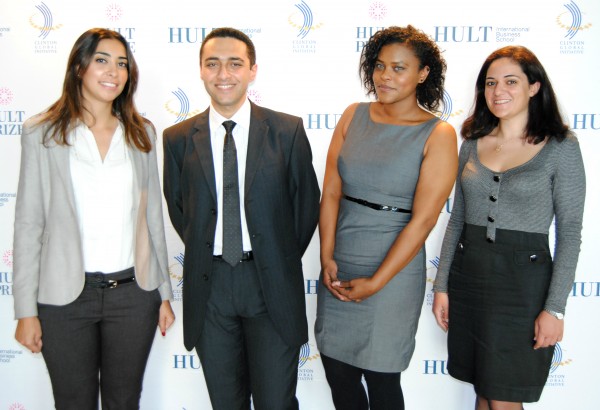BY MARY ARVANI

Going into its sixth year of operation, the Hult Prize Competition is already one of the largest and most successful social entrepreneurship contests in the world.
The competition allows a diverse mix of students and experts to interact and work towards creating a profitable business that would serve a social purpose.
“It encourages the world’s brightest business minds to compete in teams to solve the planet’s biggest challenges with innovative ideas for sustainable start-up enterprises,” the Hult Prize official website states.
Not only do groups of students get to plan out large-scale projects to tackle major issues such as poverty and nutrition, and non-communicable diseases in slum areas – with the aid and guidance of experts, CEO’s of major companies, and Nobel laureates, no less – but the winners also receive $1 million in seed money in order to implement their idea.
Alyaa Ahmed Younis, campus director for the Hult Prize at AUC, is determined to provide students with the best possible support and guidance to participate in the competition for the upcoming year, 2015, in which the issue to tackle is early childhood education in urban slum areas.
The competition is a yearlong process in which students who reach the finals travel to New York City and pitch their ideas at the Clinton Global Initiative (CGI) to former US President Bill Clinton, among others.
“I’m not just trying to get a team there [to the regionals], I’m trying to get a really strong team there,” said Younis.
Younis had participated in the competition earlier in March 2014, after recruiting a team at AUC; however the team did not enlist any advisors and had to find their own way through the competition.
“This year the plan is to make it a lot easier and provide a lot of support for AUC teams, so once they go they are sure that they are really well prepared,” said Younis.
“Ideas have to be scalable, applicable, innovative, and applied in a special way,” explained Younis when asked what participating students should target.
The teams entering the competition are comprised of a minimum of three students, and a maximum of five.
In order to get accepted into the competition, the team must have a stand-out statement prepared.
Younis is aware of students’ fears of approaching such a large-scale competition.
“For me, I thought it was a life changing experience and I feel like a lot of students should try to participate… business, or not.”
Younis stressed the importance of having a diverse team from various academic backgrounds as each person can apply certain expertise to certain aspects of the project.
In fact, Ayman Ismail, Assistant Professor and Abdul Latif Jameel Endowed Chair of Entrepreneurship at the Department of Management School of Business, said that, “to be an entrepreneur, you don’t have to be a business student.”
Ismail, as well as Ahmed Tolba, Assistant Professor of Marketing at the Department of Management School of Business, are two of the advisors and mentors that will be on hand to assist the competing AUC teams.
“My role is to help them in the organization of the event, conduct a workshop to train the teams on social entrepreneurship, and act as a faculty advisor for the winning team prior to traveling for the competition,” said Tolba.
When asked about the advantages that AUC students would have going into the competition, Tolba replied, “We have been there for two years, so the advisors know the competition. Also, our students are well-trained on research and presentations, and they usually get involved in extra-curricular activities. I hope that the training we will provide them will be an asset as well.”
Younis has already developed a partnership with The International Conference on Global Economy (ICGE) and plans to start recruiting students as soon as possible.
“We started a partnership because Alyaa needed a partner on campus to reach graduate and undergraduate students,” said ICGE president Yasmine Helmy.
Helmy added that ICGE will also be providing the judges for the competition that will take place on campus. “[The competition] is relevant to our mission,” she said.
The competition between AUC students to be put through to Regionals will take place at the AUC New Cairo campus on December 6.
Until then, there will be a number of training sessions, seminars, and information sessions in which students will be able to rally useful information and advice.
Tolba believes that AUC students will benefit a great deal out of participating in the competition. “AUC students will understand a major social problem in-depth,” he said, “this year, it is education in urban slums. This is a real-life situation that is quite challenging. So it is community-based and very practical.”
An aspect of the competition to which both Younis and Tolba strongly agree on is how enriching and rewarding the overall experience is.
“I’m really excited… it’s really scary, but really rewarding at the same time, that’s what I like about Hult,” said Younis, “I think a lot of people should just go for it and participate, you never know.”
After all, even Nobel Laureate Mohammad Yunus dubbed the Hult Prize, “The Nobel Prize for students.”
